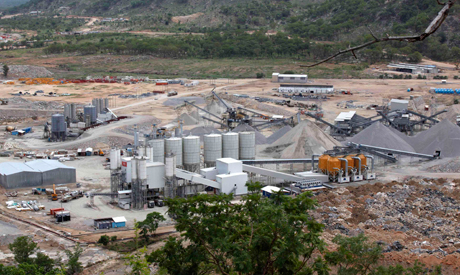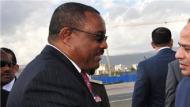When it comes to the Nile River, Ethiopia and Egypt have invariably been at odds. Disagreement, mistrust, fear and rivalry, what Wondwosen Michago, one of the experts on the Nile, calls hydro-mentality, has been the norm in the relationship of the two countries for hundreds of years. It therefore came as no surprise when Ethiopia and Egypt stood on opposite sides with respect to the 2011 Nile Basin Cooperative Framework Agreement.
Similarly, the escalation of tension between Egypt and Ethiopia following Ethiopia's launching of the Grand Ethiopian Renaissance Dam (GERD) on its share of the Nile River close to the border with Sudan was not only predictable but also certain. This heat over the Nile reached its high point when Egyptian elites in a televised consultative meeting that former President Mohamed Morsi convened in June 2013, discussed masterminding political unrest and even a military offensive against Ethiopia.
Seen against this background, the signing of the declaration of principles regarding the Grand Ethiopian Renaissance Dam by Ethiopia, Egypt and the Sudan on March 24 cannot be anything but a paradigmatic departure.
Paradigmatic departure
As significant as the content of the declaration of principles is, the fact that Ethiopia and Egypt have agreed on the Nile is in itself historic.
Certainly, this marks a significant step for both overcoming the long-standing tension between the two countries and beginning a more cooperative engagement regarding the development of the Nile waters. For Egypt, it represents a turn away from the threat of war that risked to derail the talks between the countries for addressing concerns over the impact of the GERD.
For Ethiopia, the signing of the declaration by all three countries vindicates its repeated declarations assuring Egypt and Sudan that it is committed to ensure that GERD will have no adverse effect on the two countries. Significantly, the declaration affirms the trend that emerged in Egypt's policy position since Abdel Fattah el-Sisi's rise to power towards recognising Ethiopia's construction of the GERD as legitimate.
Expected to be Africa's largest hydroelectric dam upon completion,
the GERD is envisaged to produce up to 6,000 megawatts of electricity during good rainy seasons.
The origin of the declaration of principles goes back to the joint tripartite technical committee of experts that the three signatories of the declaration established following the commencement of the building of GERD in 2011.
Tasked with the mandate of studying the possible impacts of the GERD on Sudan and Egypt, after a year-long review of the study and design documents, project site visits and consultations with Sudan and Egypt, the tripartite committee undertook and submitted its findings to the three countries in May 2013.
Following up on the report of the committee, the three countries launched tripartite talks in Sudan involving the water ministers. After several rounds of talks, Ethiopia and Egypt failed to overcome differences and the tripartite talks on the Ethiopian dam was suspended indefinitely in January 2014.
Shift in regional power balance
A major turning point was the election of Sisi as president of Egypt in May 2014. In a departure from the threatening rhetoric of Morsi's government and determined to restart the tripartite talks between the three countries, Sisi in his first meeting with Ethiopia's Prime Minister Hailemariam Desalegn, on the sidelines of the African Union Summit in Malabo, Equatorial Guinea on June 26, reached an agreement to work on their differences regarding GERD and restart the tripartite process.
Following the resumption of the tripartite negotiations in August 2014, Ethiopia, Sudan, and Egypt agreed to commission an international consultancy company to conduct a social, economical and environmental impact assessment of GERD.
Alongside, the technical negotiations, the countries launched political level talks. This led to the March 3 meeting of t
he foreign and water ministers of the Eastern Nile countries of Egypt, Sudan, and Ethiopia at which the ministers hammered out the details of the declaration of principles.
At the end of the three-day meeting, Sudanese Foreign Minister Ali Karti told reporters: "A full agreement has been reached between our three countries on the principles of the use of the eastern Nile Basin and the Ethiopian Renaissance Dam."
One of the factors that formed the defining context leading to the signing of the declaration of principles has been the emergence of GERD as a new reality and Ethiopia's insistence to address Egypt's concerns through dialogue.
Ethiopia has been keen for its legitimate right to undertake projects over the Nile for its development endeavours to be recognised. For this, it is backed by the completion of over 40 percent of the contraction of the GERD and 24/7 construction work on the dam. For its part, Egypt, while continuing its engagement over the technical work that needs to be done under the tripartite committee, has sought to secure written political consensus assuring it that no significant harm would result from GERD.
While the signing of the declaration of principles constitutes an acknowledgement of the shift in the regional balance of power in favour of Ethiopia, it represents a milestone in Egypt's concerted effort at containing the continuing loss of ground over the hydro-politics of the Nile.
Within the Nile Basin Initiative, Egypt's loss of influence came to light when most of the Nile riparian countries signed the 2011 Nile Basin Cooperative Framework Agreement. The move in the diplomatic power balance in favour of Ethiopia was reinforced when Sudan, abandoning its long-standing alliance with Egypt on the Nile, declared in December 2013 its support for GERD.
Declaration of principles
It clearly emerges from the above that the declaration of principles represents a compromise. Accordingly, no country got all that it might have asked for, or conceded an outright loss. The declaration of principles contains elements that cater for and balances the rights and interests of the signatories.
The declaration of principles also seeks to address the suspicion and longstanding animosity that have defined relationships over the Nile for so long. Accordingly, a significant part of the declaration addresses issues relating to cooperation, confidence building, exchange of information and data, as well as peaceful settlement of disputes.
Clearly, the signing of the declaration of principles is a huge positive development that has the potential of transforming the tension riddled regional relations in the northeast and Horn of Africa. This declaration should however be treated for what it is - a declaration manifesting political as opposed to a legal commitment of the signatories.
At the moment there are promising signs that the countries are bent on building on the declaration and opening a new chapter in their relationship. Soon after the signing of the declaration, Sisi flew to Ethiopia for a three-day official visit.
During the visit, the president held meetings with the president of Ethiopia, Mulatu Teshome, and the Patriarch of the Ethiopian Orthodox Church Pope Mathias. He also addressed the joint session of the two houses of the Ethiopian parliament in the presence of diplomats in Addis Ababa.
Whether this declaration permanently changes the hydro-politics of the Nile for good will depend on the ability of the countries to walk the talk (in the declaration) through changes in their discourse and practices at all levels, nationally, regionally and globally.
Dr Solomon Ayele Dersso, a legal scholar and analyst of African international affairs who writes on current African issues, is a senior researcher at the Institute for Security Studies, Addis Ababa office.
The views expressed in this article are the author's own and do not necessarily reflect Al Jazeera's editorial policy.




 Print
Print Email
Email